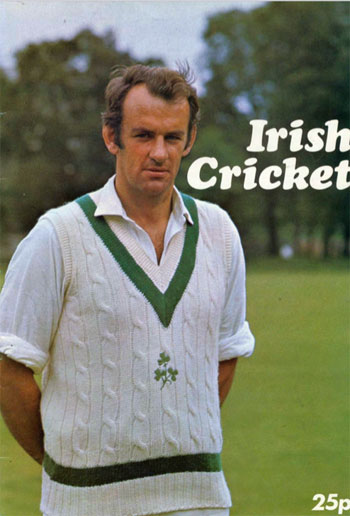Late last year one of the 699 men who have played for Ireland lay on his death bed. One of his proteges, himself an international, came to visit and chat about their sporting days. As he was leaving, the older man called him closer, and whispered into his ear.
'We're all Test cricketers now,' he smiled, happy to be leaving this world with the greatest label the sport can bestow.
Cricket is very conscious of its heritage and traditions, sometimes stultifyingly so, but the Test will also show a new audience the giants on whose shoulders the Ireland XI will stand.
You can draw a line from the 1950s to today through six men who made their debut in each of the decades. They, and all living male and female internationals, will be at Malahide next Sunday, recipients of a Cricket Ireland invite to enjoy the occasion and take part in a ceremony during the tea interval.

He saw enormous changes over his own career: "I played for 20 years and when I started we played believing we couldn't win. By the end we played every game believing we could - we did have better players but our attitude had definitely changed.'
Brendan 'Ginger' O'Brien (52 caps, 1966-81) played in a very different time. 'The lads now travel first-class all round the world and stay in five-star hotels. I remember getting a letter from the ICU telling me I had been selected and to 'ensure your whites are clean and pads are whitened. Please enclose a cheque for £105 with your acceptance.'
"The secretary wrote to one guy telling him he had noticed a copy of the Daily Express outside his hotel room door and would he send a cheque for 25p."
Money was always an issue for the strictly-amateur ICU in Michael Halliday's time too (93 caps, 1970-89).
'In 1973 we toured America, which meant losing three weeks' pay - and I also had to pay a substitute teacher!'
'When I started one-day cricket wasn't taken seriously - we didn't even get caps for those games. But Derek Scott saw the way the game was going and we developed.'

"The main difference is that we would be facing 60mph bowlers at Ballygomartin Road one week and then Michael Holding and Sylvester Clarke the next. It was a total contrast and very difficult to make that step up. William Porterfield and Paul Stirling are used to facing that sort of bowling day-in day-out so their instincts and reflexes are sharper."
Angus Dunlop (114 caps, 1990-2000) says the biggest chance has come in 'fitness and belief - that came with hard work and structures being put in place. My generation would have loved the opportunity to train all day, so we will never know how much better we could have been.'
Peter Gillespie (124 caps, 1996-2007) also sees fitness as the biggest change in the last 20 years. 'Training and conditioning was in its infancy when I started. Time was also an issue for those of us with a full-time job. At one stage I played 19 days out of 21, so something had to give. Now that its professional it's possible. But we lost talented guys like Neil Doak because rugby was able to offer a living.'
The players who got away is a recurring theme, and there is little doubt that many Irishmen could have played at higher levels. There are candidates from all eras. "Players like Ivan Anderson and Jack Short could certainly have played county cricket, and that is just one step up to Test level', suggests O'Riordan.
O'Brien reckons O'Riordan, wicketkeeper Ossie Colhoun and batsman Anderson could have gone all the way if they'd have the opportunities. 'I like to think I could have played at the highest level,' says Dunlop, 'and I'm sure the likes of Alan Lewis, Jason Molins, Garfield Harrison and Kyle McCallan could have to.'
There is some concern about Ireland's step up into Tests, with few expecting the transition to be smooth.
"Aiming to bat all day is a very different proposition to playing one-day matches and trying to score quickly', says Warke. 'I'd have a wee bit of concern how we will do against a team of Pakistan's quality."

He is also unsure about the point of playing five-day games. 'I was watching tests on TV over the winter and almost no-one was there. The atmosphere is funereal, and I don't see any benefit from it. Full membership is important for the status it brings, but ODIs and T20s will be more important.'
Angus Dunlop disagrees. 'I've always been an advocate of long-form cricket in developing the game. It gives batsmen more time and allows bowlers longer than 10-over spells in a day.'
O'Brien sees more of Ireland than most, enjoying his retirement by travelling with his wife Camilla to watch their youngest sons play for Ireland. Between them, Niall and Kevin have won ten times as many caps as their dad.
"It keeps me young," he says, "We've been to Australia, South Africa, Sri Lanka, India, West Indies, which I probably wouldn't have but for the lads."
Since they retired from playing, all six have given up their time to coach or administer, part of the volunteer ethos that sustains the game.
"I was very aware that I was representing Ireland and conscious of so many guys who went before me', says Gillespie. "It was your time, you had a crack, and then you passed on the baton."
"I remember when I passed [fellow north-westerner] Ossie Colhoun's 89 caps and feeling embarrassed. Those guys played only a few games a year.'
Stephen Warke is also conscious of his place in the timeline "It's part of our history, and it's a great honour to have been part of that.'
